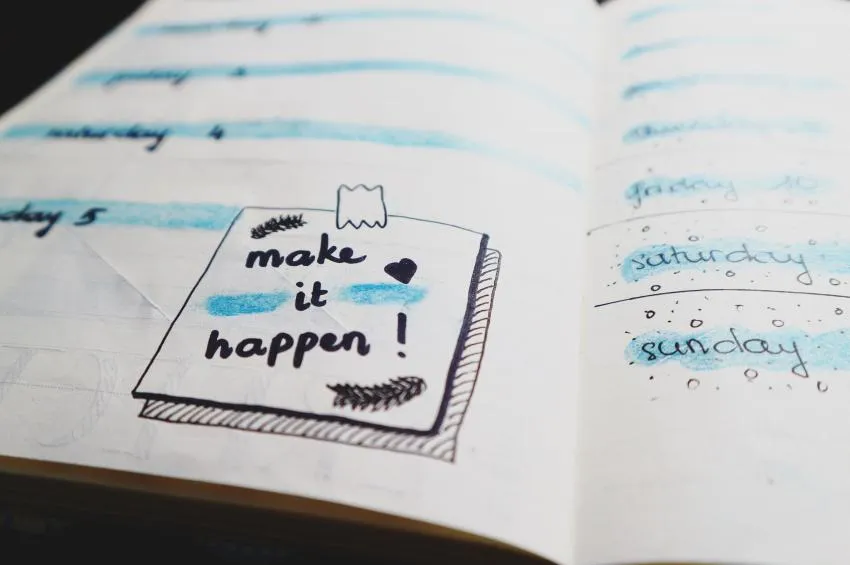How To Survive A Quarter-Life Crisis
Growing up, I heard a lot about the mid-life crisis. I knew that there might come a point halfway through my life where I would start to question things, and my whole world would be turned upside down. No big deal, I still had a few decades before I had to worry about that right?
Wrong. I must have missed the memo that somewhere in my twenties I would encounter something similar: the quarter-life crisis.
Put simply, the quarter-life crisis is the crippling anxiety felt by people in their 20s and 30s about where their lives are going from here. This is usually when people settle into their adult lives and realize that they might not be as happy as they thought they were going to be. Or maybe they've realized they have changed and want something different, but don't know how to start over.
If you currently find yourself in this predicament, here are a few tips to get you through the worst of it!
1. Develop a strong support system

It might feel like it, but you're not alone. If you ask your friends, you would be shocked to discover that most people in your age group are going through the same thing. Everyone is trying to figure out what their purpose is and what they want to do with their lives, just like you. Although no two stories are the same, having people to talk to who understands your frustrations is essential.
People who are much older or younger than you might be a bit out of touch with your experience, but they might still want to support you in any way they can. This can come through advice, words of encouragement, a listening ear, and more. Having both kinds of people in your immediate circle is ideal for receiving the support you need.
2. Use your network

I've said it before and I'll say it again: Nowadays connections get you further than qualifications ever will. Go through your list of professional contacts and make a point of reaching out to them for potential opportunities in your field(s). It may seem weird at first putting yourself out there in such a way, but an important part about growing up is learning to ask for help.
The more people that know your name and your professional goals, the more people are in a position to help you advance your career. Ask others about their experiences in your industry, and where you should start. Look at the people you know who are already in a position you would like to be in and pick their brains. Ask them what they wish they knew when they were in your position. Ask them what they did to get where they are, and if they have any guidance to offer you.
It can make a world of difference!
3. Research to discover new hobbies

Maybe you aren't sure what you want to do at all. Or maybe you've recently changed your mind and are feeling lost. Have no fear, there is a world of possibilities for you out there!
Spend some time researching to discover new hobbies and interests. Look into different career paths. Listen to other people's stories. Read books, watch YouTube videos, attend motivational talks or speeches — do whatever you have to do to expose yourself to new ideas and perspectives. Eventually, you might discover something that will set you on your path.
4. Try new things and find what you are good at

Chances are, you are feeling overwhelmed because what used to work for you isn't working anymore. Maybe you don't find joy in the same things you used to. That's perfectly okay! We tend to cling to what's familiar to us, but we also have to give ourselves room to grow. Someone once said that insanity is doing the same thing over and over and expecting different results. If you want to get out of the funk, you have to come at it from a different angle.
Use the information you gained from your research to try out new activities. It might be daunting at first, especially if you're like me and get frustrated when you're not good at something right away. However, practice makes perfect and you have to start somewhere. If it doesn't work out for you, then move on to something else. Don't stop exploring options until you find that thing that lights your fire.
5. Map out a gameplan

Once you've got an idea about a potential direction you can go with your life, sit down and map it all out. Look at your big picture goals, and then break them down into smaller, digestible projects that you can work on overtime. Set goals and deadlines for yourself, but remember to be reasonable. Don't rush into doing too much too soon!
For example, your big picture goal might be to become a lawyer. Smaller goals can be researching law schools, reading up on advice from current lawyers, making a timeline, or estimating costs. These things don't all have to be done in one day, rather you can set deadlines based on your bandwidth. You can aim to research schools by the end of the week, but give yourself until the end of the month to create the timeline.
The big picture might seem impossible, but once you break it down into more realistic steps it doesn't seem as scary to take that first leap.
6. Take things one step at a time

That being said, once you break it down, you have to focus on the individual pieces. It can be overwhelming to focus on the big picture all the time. You may get discouraged about the number of things you still have to do, or the time it will take to do it. This is what stops many people from moving forward with the plan!
We tend to want to find the quickest solution, and sometimes abandon the better solution because we think we don't have enough time to make it happen. I say, as long as you're breathing, you have enough time. You can't do everything all at once, and things don't just happen overnight. If you focus on your small goals — the parts of the plan that you can do something about — you will work your way up to the bigger things before you know it.
7. Give yourself time

Everyone is on a different timeline. Don't rush your process. There is no pre-determined age you're supposed to have it together. As a matter of fact, "having it together" doesn't exist. Everyone you know is out here doing the same thing as you: trying to figure it all out. You still have so much to do and so much to learn.
I know you probably feel like you should be at a certain point in your life right now, but you're doing yourself a disservice by thinking you've done something wrong in comparison to others. Things will happen for you when they are supposed to, whether that be in 2 months or 2 years. Focus on what you can do in the near future to affect the distant future.
8. Celebrate all accomplishments

When you accomplish one of the goals you have planned out, acknowledge it! Reward yourself for your perseverance.
You may feel like you don't have any recent accomplishments, and that is why you feel like you have failed. However, there is nothing too small to be celebrated. Even if it's something basic like getting out of bed in the morning when you didn't want to, every action you take is moving you toward your future. Your day is full of small accomplishments, you just have to look for them!
9. Remember that everything will work out the way it's intended to

One day, you're going to look up and things will have settled. It might not look exactly the way you imagined, but it will be something. It will be a destination that you reached by taking action and making the right decisions for yourself.
You're going to make mistakes. Life is going to throw you curveballs and push you off your course. Don't fight it too much. You must adapt and keep it pushing. If you power through, the story that is meant for you is waiting on the other side.
I don't want to call it a happy ending; I can't promise that. However, it will be something definite, which is what you long for right now. You want to know where you will be and what you'll be doing. If you power through, you will eventually be older doing something somewhere. Just do the best you can every day, and remember that larger forces are working to get you to where you need to be. You just have to trust the process.
Opinions and Perspectives
The support system advice is crucial. Finding others who understand makes such a difference.
The advice about celebrating small wins has helped me stay motivated during tough times.
Trying new things is scary but necessary. Currently pushing myself out of my comfort zone.
I appreciate how the article acknowledges that this isn't just a phase but a real challenge.
The networking advice is spot on. Just landed a new job through an old connection.
The part about adapting to change really resonates. Life rarely goes as planned.
Started implementing these tips and already feeling more confident about my future.
Reading about others going through similar experiences makes me feel less alone in this.
Wish there was more discussion about maintaining relationships during this period. It can be really isolating.
The advice about breaking down big goals into smaller ones really works. Currently working through my own list.
Sometimes the crisis is about more than just career. It's about identity and purpose too.
Finding what you're good at takes time. I'm still discovering new strengths at 32.
The timeline pressure is real. Society makes us feel like we need to have it all figured out by 30.
This crisis really pushed me to reflect on what I actually want versus what others expect of me.
The advice about trying new things led me to discover passions I never knew I had.
Interesting how different cultures handle this phase of life. In some places it's not even acknowledged.
Been applying these tips for a few weeks and already feeling more focused and less anxious.
I like how the article acknowledges that the end result might not be what we initially imagined.
Found myself nodding along to every point. Currently in the middle of this and it's tough.
The article could use more advice about dealing with family pressure during this time.
This resonates so much. Currently mapping out my game plan after months of feeling lost.
The support system advice is great but what if your friends are all in different life stages?
Not sure I agree with the trust the process part. Sometimes you need to make things happen yourself.
The advice about breaking down big goals helped me tackle my career change. One year later and I'm in a much better place.
I think social media makes quarter-life crises worse. Everyone looks like they have it figured out online.
The part about comparing timelines really hit home. Finally learned to focus on my own journey.
Wish I had read this article sooner. Spent too much time thinking I was the only one struggling.
Started following this advice three months ago and already feeling more directed. Small steps really do add up.
Love the message about trusting the process but it's tough when you have bills to pay and responsibilities.
The article doesn't mention how exhausting it is to constantly be figuring things out.
I actually found my new career path through trying random hobbies. Never expected that!
The networking advice works but it feels so uncomfortable reaching out to people you haven't talked to in years.
Learning to celebrate small wins has been game-changing for my mental health during this time.
The article could use more advice about handling the financial stress that often comes with this period.
I find it interesting how this seems to be such a common experience yet we all feel so alone in it.
The part about adapting to curveballs is so true. My crisis led me down an unexpected path that turned out better than planned.
Started therapy during my quarter-life crisis and it was the best decision ever. Maybe that should be added to the advice.
I like the practical steps outlined but wish there were more specific examples of how others navigated this.
The advice about not rushing is good but there's also such thing as waiting too long to make a change.
My quarter-life crisis led me to start my own business. Sometimes these challenging periods push us in the right direction.
I wonder how many people actually end up in careers they planned during their quarter-life crisis.
The support system part is crucial. I tried dealing with this alone and it just made everything worse.
Been there, done that. Trust me, it gets better. I'm 35 now and look back at my quarter-life crisis as a growth period.
I appreciate how the article emphasizes that having it all together is a myth. That's honestly comforting.
The timeline thing resonates with me. I kept comparing myself to others until I realized everyone moves at their own pace.
It's refreshing to read something that acknowledges this struggle without trying to sell a quick fix solution.
I found the networking advice helpful. Just reached out to some old colleagues and got some great leads.
Strongly disagree. These feelings are very real and shouldn't be dismissed as just growing pains.
Sometimes I think quarter-life crisis is just a fancy term for normal growing pains.
The research advice is good but I feel like I've been researching forever without taking action.
I wish the article talked more about financial aspects of changing careers during this phase.
You're right about wanting immediate answers. I'm learning patience is key but it's not easy.
Trusting the process is the hardest part. I want to know where I'll end up right now!
The part about celebrating small accomplishments is underrated. I started keeping a win journal and it helps me stay positive.
I needed to read this today. Been feeling stuck in my job for months but too scared to make a change.
Taking things one step at a time really worked for me. I was overwhelmed until I started breaking everything down into smaller tasks.
The article makes it sound so simple but changing careers in your late 20s with bills to pay isn't that straightforward.
I actually think having more options is better than being stuck in one path. We just need to learn how to navigate them.
Sometimes I think our parents had it easier. They didn't have endless career options like we do now.
The gameplan suggestion is practical but I find it hard to make plans when I don't even know what I want to do with my life.
That's actually inspiring about the pottery classes. I've been too scared to try new things but maybe I should just go for it.
Love the point about trying new things. I started taking pottery classes last month and it's become my new passion!
Anyone else feel like social media makes this worse? Seeing everyone's highlight reels while I'm struggling to figure out my next step is rough.
I disagree about connections being more important than qualifications. In my field, you need both to succeed.
The support system advice is spot on. My friends have been my lifeline during my quarter-life crisis. We're all figuring it out together.
This article really hits home. I'm 27 and feeling completely lost in my career path. Nice to know I'm not the only one going through this!
